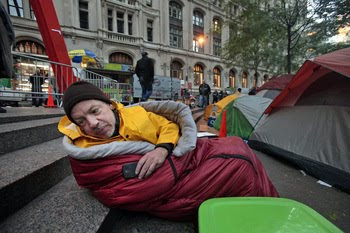George Packer wrote an outstanding article in The New Yorker on a handful of the occupiers just before Liberty Plaza was cleared out by the cops. The article focuses on 53 year old Ray Kachel from Seattle, whose story before Occupy is very compelling and illustrative of what happened to a lot of highly skilled and educated professionals over the past 3 years. Mr. Kachel, a former high tech jack of all trades from Seattle, once did quite well and prospered doing odd jobs and freelance work in the once broadly tolerant culture of Seattle's tech industry. His opportunities all dried up over the last 2 years. He spent his last $250 on a bus ticket from Seattle to New York to join Occupy, and is now officially homeless on the streets of New York.
Packer concentrates on Kachel, but uses him as a means of getting to know a number of other people in and around the encampment, all of whom have their own remarkable stories. Kachel, and a number of others in the encampment, found friendship and community for the first time in their lives in Liberty Plaza.
I must admit that I had similar experiences in political activity from various gay causes to union organizing. There is that rapturous experience of discovering fellow travelers, and the pleasant surprise of finding them in unexpected places. And there is the thrilling experience of waking up from the usual dull resignation we all live in to discover that together, we might actually be able to move that huge inert tonnage called history even a fraction of an inch. These experiences could be described as "pentecostal."
I still keep in contact with friends I made during an effort to unionize a Borders Books store. That was more than 12 years ago.
What does it say about me, or about church, that I've had far more of these experiences outside of church, or even the bounds of what could be called "religious?"
Something that the article touches on is institutional failure. A defining feature of our day is the across-the-board failure of institutions to do their jobs; from governments to businesses to academies to churches. Economist Duncan Black yearns for a "well-functioning and trustworthy banking system, and not one built on a foundation of crime and fraud." I yearn for a government answerable to the people who are supposed to be its source of legitimacy. I yearn for churches that are more about binding up the wounds of a bleeding world and sewing hope and love where there are none than about enforcement of social and cultural norms. More often than not, institutions betrayed their charters, their founding principles, for the sake of self-serving and self-preservation. Small wonder Anarchism, once the common enemy of communist and capitalist , enjoys a resurgence these days.
I'm not an Anarchist. I believe in the rule of law and in the necessity of institutions to make life bearable for everyone. But I definitely have my Anarchist sympathies.
CLARIFICATION:
What I meant by "pentecostal" is the experience described in these 2 paragraphs from George Packer's article:
The sense of togetherness in the park that night was like nothing he’d ever felt. Garofalo still found the drummers annoying, and the activists who dreamed of an alternate world of pure democracy, without rules, were not for him. Still, he now felt responsible for keeping Occupy Wall Street going. He wanted others to make the pilgrimage: “If you bring someone down here for a day, they’ll attach so much emotion to being here that it will have an effect next year, even if this isn’t here the day before the election.”
A period in Garofalo’s life had ended—the period when being amusing was the highest goal because being serious felt futile. He was now ready to carry a sign on the sidewalk along Broadway. He stayed up nights trying to think of the right one: “I have a job, but I think being here is important”; “You’re cynical, lazy, and would be ashamed to tell your kids you did nothing.” Finally, one morning, he went down to Zuccotti Park with a signboard that said, in red block letters, “I Don’t Have a Lobbyist, Can I Still Have 3/5 of a Vote?” Garofalo was split, seventy-thirty, on his own sign: he thought that it was witty, but the reference to slavery was only a few steps away from invoking the Nazis. Yet he stood on the sidewalk for more than an hour and held the sign aloft while people paused to read it.
Read the article folks. It's definitely worth the time.

3 comments:
"What does it say about me, or about church, that I've had far more of these experiences outside of church, or even the bounds of what could be called "religious?" "
But Doug --baptism is our commission to do that very thing.
These experiences could be described as "pentecostal."
***
What does it say about me, or about church, that I've had far more of these experiences outside of church, or even the bounds of what could be called "religious?"
That you're Episcopalian, not Pentecostal? [NB: there are such things as Charismatic Episcopalians (not to be confused w/ the denomination of that name). My grandmother, OBM, was one.]
I happen to really like liturgical BCP worship. Pentecostal (large P or small p) experiences are exciting, but CAN lead to burn-out. I'm glad my worship life isn't subject to these kind of mood-swings. JMO.
I don't think my religious life depends on mood swings.
I think I was referring to something a little more profound than differing modes of worship.
Perhaps if you read George Packer's article, you'll see what I meant.
Post a Comment